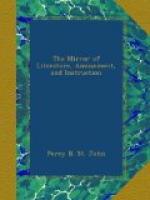With these views, I respectfully submit to the clergymen of the new churches to pursue the course which receives such universal approbation in St. James’s Chapel, Mornington-place, Hampstead-road. The simplicity and effect must be strong motives to excite their attention, and I hope to witness its adoption.
CHRISTIANUS.
* * * * *
THE THIEF.
(For the Mirror.)
I tell with equal truth and grief,
That little C—’s an arrant
thief,
Before the urchin well could go,
She stole the whiteness of the snow.
And more—that whiteness to
adorn,
She snatch’d the blushes of the
morn;
Stole all the softness aether pours
On primrose buds in vernal show’rs.
There’s no repeating all her wiles,
She stole the Graces’ winning smiles;
’Twas quickly seen she robb’d
the sky,
To plant a star in either eye;
She pilfer’d orient pearl for teeth,
And suck’d the cow’s ambrosial
breath;
The cherry steep’d in morning dew
Gave moisture to her lips and hue.
These were her infant spoils, a store
To which in time she added more;
At twelve she stole from Cyprus’
Queen
Her air and love-commanding mien;
Stole Juno’s dignity, and
stole
From Pallas sense, to charm the
soul;
She sung—amaz’d the Sirens
heard
And to assert their voice appear’d.
She play’d, the Muses from their hill, Marvell’d who thus had stole their skill; Apollo’s wit was next her prey, Her next the beam that lights the day; While Jove her pilferings to crown, Pronounc’d these beauties all her own; Pardon’d her crimes, and prais’d her art, And t’other day she stole—my heart.
Cupid, if lovers are thy care,
Revenge thy vot’ry on this fair;
Do justice on her stolen charms,
And let her prison be—my arms.
W.H.H.
* * * * *
SHAKSPEARE.
(To the Editor of the Mirror.)
In the Drama entitled Shakspeare’s Early Days, the compliment which the poet is made to pay the queen: “That as at her birth she wept when all around was joy, so at her death she will smile while all around is grief,” has been admired by the critics. In this jewel-stealing age, it is but just to restore the little brilliant to its owner. The following lines are in Sir William Jones’s Life, translated by him from one of the Eastern poets, and are so exquisitely beautiful that I think they will be acceptable to some of your fair readers for their albums.
T.B.
TO AN INFANT.
On parent’s knees, a naked new-born
child,
Weeping thou sat’st, while all around
thee smil’d.
So live, that sinking to thy last long
sleep,
Calm thou may’st smile, while all
around thee—weep.




